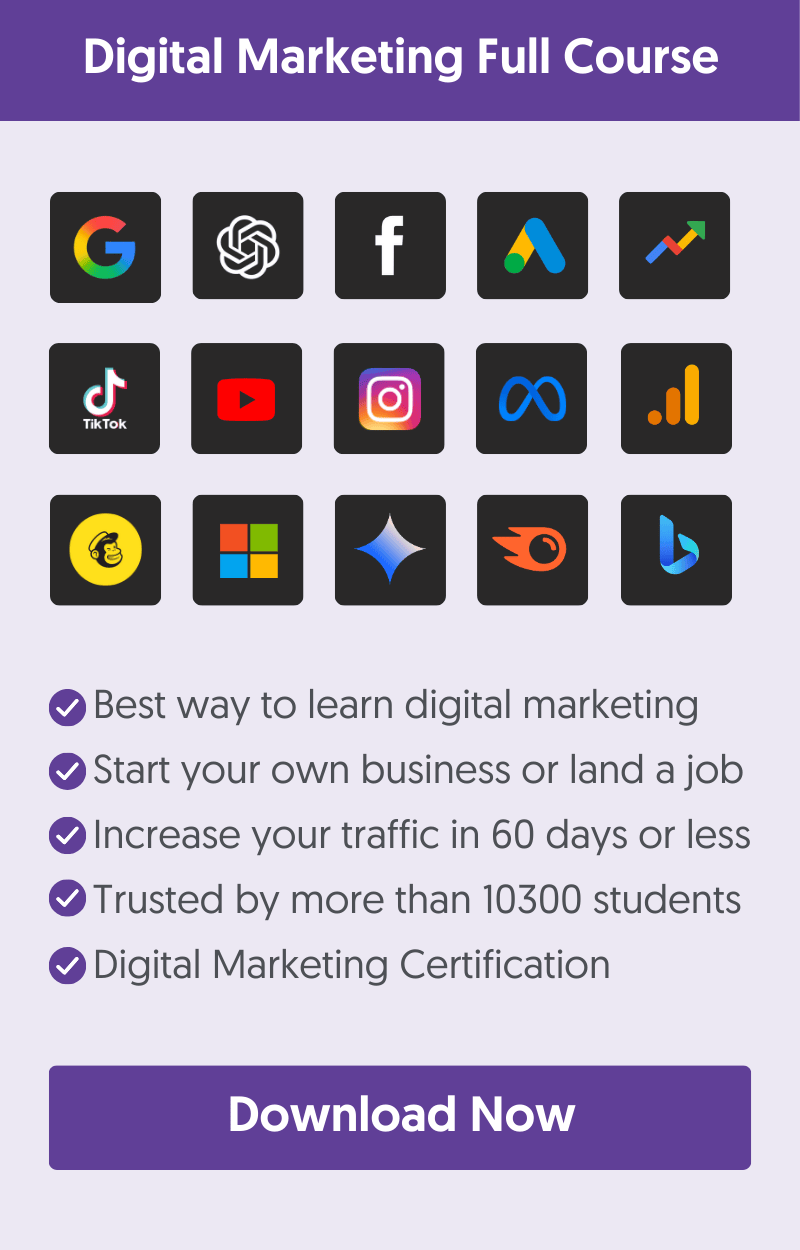Starting a digital marketing agency from the beginning with no experience is difficult but not impossible. There is a long process from nothing to having an established digital marketing business with clients and employees.
It’s not easy, but nothing stops you from making it a reality and entering the exciting world of digital marketing as a service provider.
I started my digital marketing company in 2012 after ten years as a part-time SEO freelancer. The transition from a part-time freelancer to a full-time business owner created many challenges and opportunities.
During the process, I made many mistakes, but I’ve also learned some valuable lessons that helped me improve my processes and offerings and get to the point of having a healthy and successful online marketing business.
I wrote this guide to help you start your own digital marketing agency from scratch and possibly avoid my mistakes, minimize your risks, and maximize your chances of getting it right the first time.
Is Digital Marketing a Good Business to Start?
Before we get into the specifics, let me briefly explain why a digital marketing agency is a good business to start.
There is a high demand for digital marketing services - The number of businesses that move their operations online is increasing daily, and so does the competition. More competition means more demand for digital marketing services.
You can operate a digital marketing agency from home using remote teams - One of the advantages of starting a digital marketing agency is that you don’t need to have a physical business presence.
All operations can be performed remotely using email and Skype. As a business owner, you can also minimize your costs by working from home and hiring remote teams to assist you.
You don’t need to have prior experience - Although having prior experience with SEO and digital marketing is definitely an advantage, you can gradually build your digital marketing skills using an online course and practice on your own websites before offering services to clients.
Be your own boss - If you want to escape the 9:00 to 17:00 and start your own business, becoming a digital marketing manager is a great choice.
It’s a scalable business - You can start your business by providing the services yourself and then as you get more clients you can hire more people and grow your business.
It’s a low-cost business to start - You don’t have to make a big investment from the beginning. All you need is an Internet connection, subscriptions to a couple of tools, and a website. Anything else (office space, employees, etc.) can come later as the business grows.
The fastest way to start a digital marketing business is to build your skills using a proven step-by-step training course. The Digital Marketing Full Course will teach you how digital marketing works and prepare you for starting your own agency.
How to Start a Digital Marketing Agency
These are the key steps to follow when starting your own digital marketing agency.
- Build Your Digital Marketing Skills And Self-Confidence
- Decide What Kind of Services To Offer
- Decide How You Plan To Operate Your Business
- Register Your Business
- Establish Your Web Presence
- Showcase Your Experience And Expertise
- Choose The Right Tools
- Define Your Business Model
- Get Your First Client
- Start a Digital Marketing Blog
- Build Your Portfolio
- Create Your Processes
- Build Your Digital Marketing Team
1. Build Your Digital Marketing Skills And Self-Confidence
The first step is to build the skills and self-confidence necessary to run a digital marketing agency. This can be broken down into three areas:
- Digital marketing technical skills
- Business management skills
- Self-confidence skills
Digital Marketing Skills
Obviously, if you want to start a digital marketing agency, you need to build your digital marketing skills.
This means you need to know what digital marketing is, how it works, and how to run campaigns to increase your client’s traffic and sales using one or more digital marketing channels.
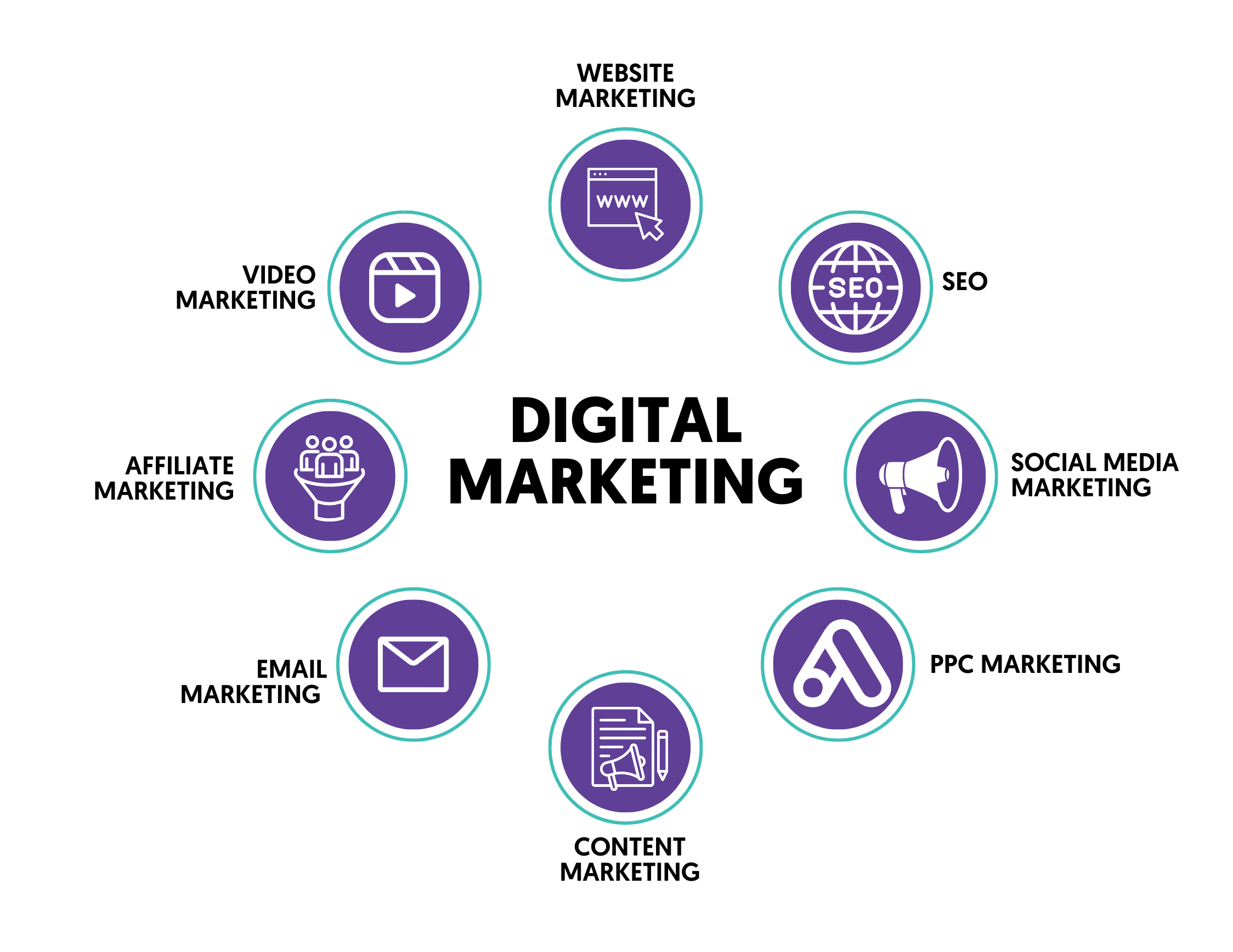
Digital marketing has a lot of components, and while you don’t have to know everything from day one, you need to have good knowledge of the following:
- SEO
- Google Advertising
- Facebook Marketing
- Social Media Marketing
- Content Marketing
- Email Marketing
As your agency grows, you can build your digital marketing team and hire experts, but if you’re starting now with no experience and money, it is crucial to know how to execute these tasks yourself.
This is a critical success factor. In the early stages of your business, you need to minimize your costs and dependency on other people.
You need to have hands-on experience with the various digital marketing processes so that, eventually, you’ll figure out what works well (in terms of money and clients) and where you’ll need help.
The best way to master a skill is to learn the theory and best practices from established experts and do a lot of practice.
Digital marketing is a highly practical discipline, and it’s not enough to know the basics you need to gain the necessary experience by practicing digital marketing.
You can use the resources below to learn digital marketing and build your skills.
- Digital Marketing Ultimate Bundle - Everything you need to know about digital marketing. A complete course for beginners and advanced users.
- Digital Marketing Specialist - How to become a digital marketing specialist.
- Digital Marketing Certificate Programs - Best digital marketing certifications to pursue.
Business Management Skills
Since your goal is to start an online business and not work as a freelancer, you need to learn the basics of running a business.
You don’t necessarily need to have a degree in Business Management, but you need to build some skills related to:
- Project management
- Time management
- Invoicing and billing
- Contracts
- HR management
As a business owner, you’ll have to do these things from the beginning and probably for a long period until you reach a point where you can hire dedicated people or outsource to professionals.
Self-Confidence Skills
You cannot run a business if you’re not willing to take some risks. To take risks, you need to have self-confidence, and to gain self-confidence in the digital marketing industry, you need to have faith in your skills.
If you start this business without knowing exactly what steps to take to improve a website’s ranking or how to use advertising to get more customers for your clients, you’ll fail.
So, before you start serving clients (as a digital marketing freelancer or agency), you need to have working experience either in an established agency or on your own websites.
Once you get to a point where you can utilize digital marketing techniques to achieve real measurable results, you’ll know that you’re ready to become a service provider.
Don’t forget that there are thousands of digital marketing professionals and agencies in the market. Clients will probably get multiple proposals and do several interviews before making a hiring decision.
Confidence will help you stand out from the crowd, so make sure you equip yourself with the necessary knowledge, skills, and experience before making the big step.
2. Decide What Kind of Services To Offer
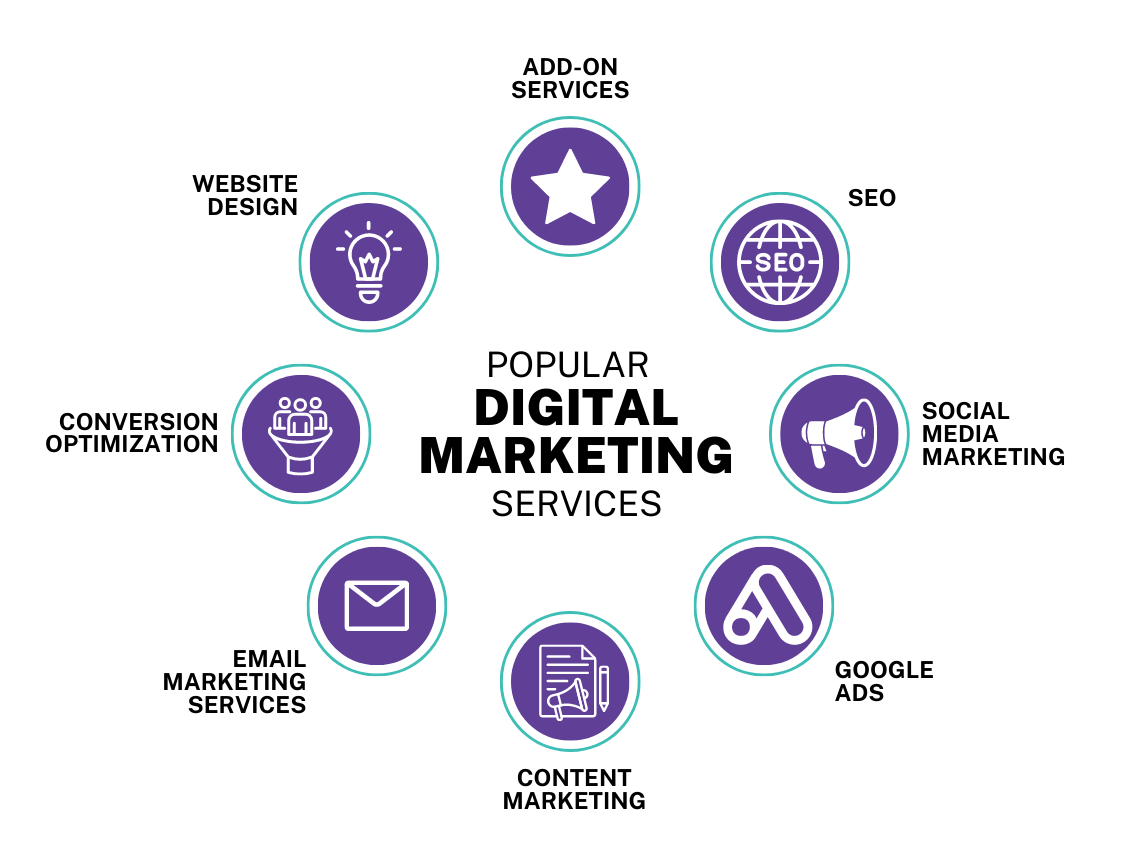
The next step is deciding what kind of digital marketing services to offer your potential clients. A full-service digital marketing agency typically offers the following services:
- Web design and Development
- SEO Services
- PPC Services (Google Ads, Bing Ads, Facebook Ads, etc.)
- Content marketing services (content writing included)
- Social media marketing services
- Email marketing services
- Conversion optimization services
As a startup, it will be very difficult to offer all these services from the beginning, so it’s better to choose the ones that match your skills.
For example, If you’re an SEO expert, you can start by providing SEO services only, and then as you grow your client base and get more money, you can add more services to your offering.
Remember that your goal at this stage is to keep your costs low and depend on your skills. If you try to go full-service from day one, there is a big chance that you’ll get lost in the process.
From my experience, the services that can generate more revenue for you are the ones that provide real monetary value to clients: SEO and PPC services.
3. Decide How You Plan To Operate Your Business
The next decision to make is how you plan to operate your business.
You have three choices:
- As a virtual company from home and hiring remote teams
- As a ‘traditional business’ with an office and local employees
- A combination of both
All three options have pros and cons, and your decision has to consider the costs and the location of your potential clients.
For example, if you plan to serve clients in a specific city, having a physical presence in the area will help you establish your brand and get more local clients.
If you plan on serving clients anywhere worldwide, having a physical office will only increase your monthly costs.
As a matter of fact, one of the advantages of starting your own digital marketing agency is that you can operate your business from home with remote employees. Many online and SaaS companies follow this model, and it’s the future of business.
As you grow your digital marketing portfolio, you may consider hiring local employees, but they can also work from their home offices, so there is no need to pay for rent and other office expenses at this stage.
What you need to do, though, is find a place in your home and set up your home office. This can be a separate room or an area in your house that you’ll use to work. Also, since you’ll be working online, you must ensure you have the best internet connection possible.
4. Register Your Business
Before proceeding with the next steps, it’s time to make it official. And by this, I mean to:
- Decide the name of your business
- Register your domain name
- Design your logo
- Register your business legal entity with the relevant authorities
- Get a toll-free number
- Find an accountant and auditor
- Find a lawyer
- Create business cards
It’s necessary to do this now and put all the pieces together even if you don’t use all of them from the beginning.
5. Establish Your Web Presence
The first actionable step in the list is establishing your online presence, starting with creating a website for your business.
The website is your agency business's ‘front door’, so you must ensure it accurately represents your brand.
Your website needs to look professional and give potential clients all the information they need to decide whether they should hire your company.
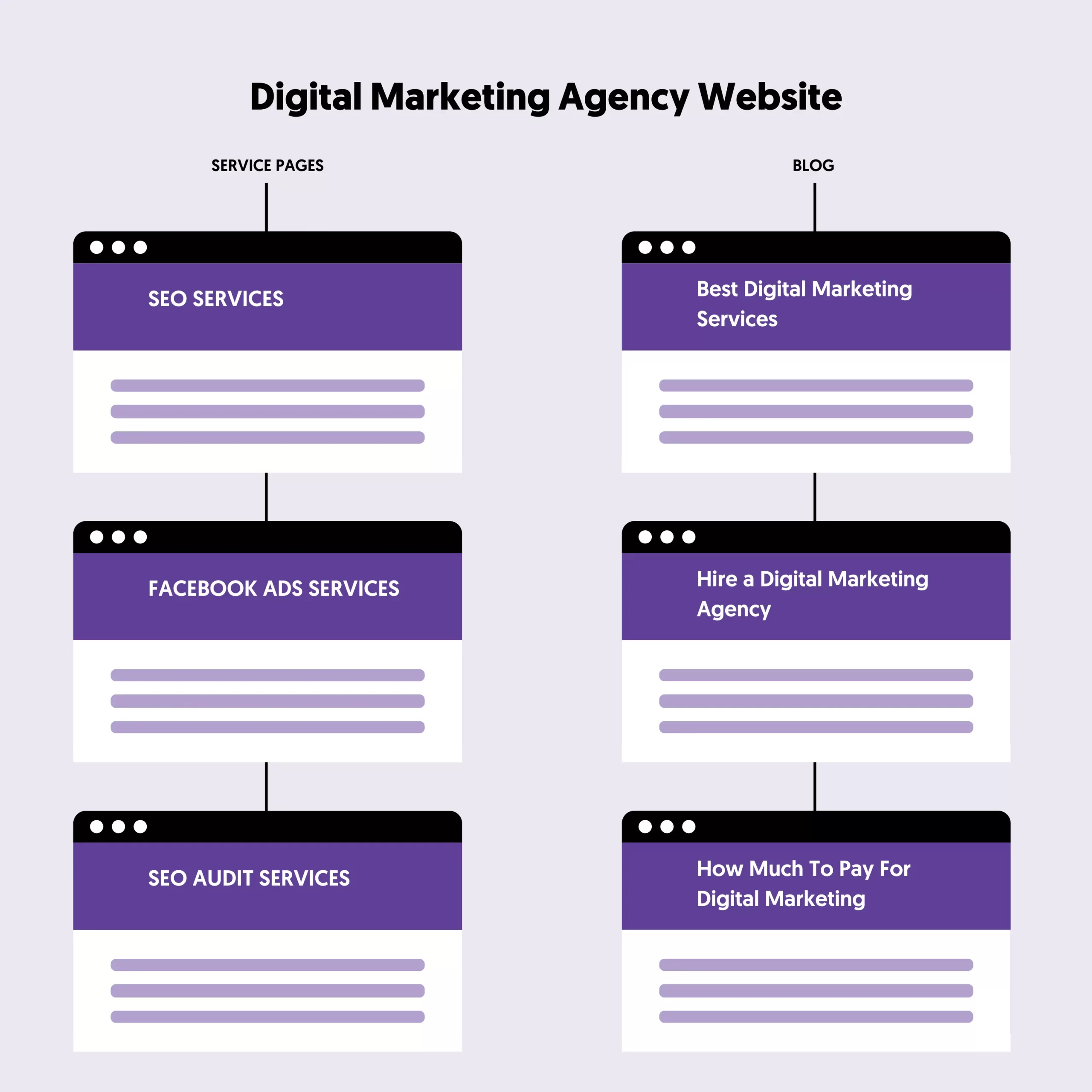
Besides explaining who you are and what you do, make sure that you explain the benefits clients will gain by hiring you. Don’t make your website about you but about them.
Create dedicated landing pages for all your services and make sure that it’s easy for potential clients to contact you without asking too many questions or having them complete complex signup forms.
Your goal is to get as many leads as possible, filter them, and concentrate on the ones with more chances of becoming clients.
Besides creating a website, you must secure your brand name on all major platforms (Facebook, LinkedIn, Twitter, Instagram, etc) and create business pages.
Don’t omit this step because clients will check your Facebook page and research more about your company before hiring, so you need to make sure that everything looks good and professional.
Additionally, register your business with websites like Crunchbase and other organizations (local, government) that can help prove your legal existence.
- Digital Marketing For Startups - tips and advice on establishing a brand for your startup business.
- How to Make a Website - a step-by-step guide on how to create a website for your business.
6. Showcase Your Experience And Expertise
As we’ll see below (step 9), finding new clients is one of the most difficult aspects of running a digital marketing agency. But, an equally important aspect is to be in a position to convince prospective clients to work with you.
The best way to do this is by demonstrating your experience and expertise.
Practically this means:
- An ‘about us' page that tells your story and achievements
- Success stories
- Case studies
- Academic credentials
- Known companies you’ve worked for
- Previous working experience
- Customer testimonials
- Partnership agreements
- Certifications
- Mentions from other websites
If you’re starting out now with no experience, it’s normal that some of the above items may not apply to you, but do keep them on your to-do list and try to achieve them gradually.
For example, do some work on a friend’s business website and ask them to send you a review or get a couple of digital marketing certifications from reputable companies.
Use the results achieved by working on your own websites and showcase them as case studies on your business website.
Do some guest posting on reputable websites and mention that on your homepage.
Be honest about your working experience and only publish real reviews and case studies. Starting a business relationship with a client based on fake reviews is not the way to establish a successful business.
7. Choose The Right Tools
To run your digital agency efficiently, you’ll eventually need a lot of tools. In fact, paying for tools licenses will be your second largest expense after paying for salaries.
You’ll need tools to help you optimize your digital marketing campaigns, create reports for the clients, invoicing, accounting, and many more.
There are many digital marketing tools in the market to choose from, but what you need to have in mind is to select tools that offer features you’ll actually use and not features that are nice to have.
It’s very common for businesses to pay for software features they will never use, so choose wisely.
Don’t forget that you should sign up for tools you can use not only on your website but also on your client’s websites, so take that into account when comparing the licensing cost of each tool.
The first tool you’ll need is a digital marketing platform like Semrush, Ahrefs, Hubspot, or Moz.
These platforms have tools that can help you with SEO, content marketing, social media marketing, and PPC campaign management.
I’m using Semrush because it’s a superb all-in-one platform with great features and reasonable pricing, but the other tools mentioned above are good for the job.
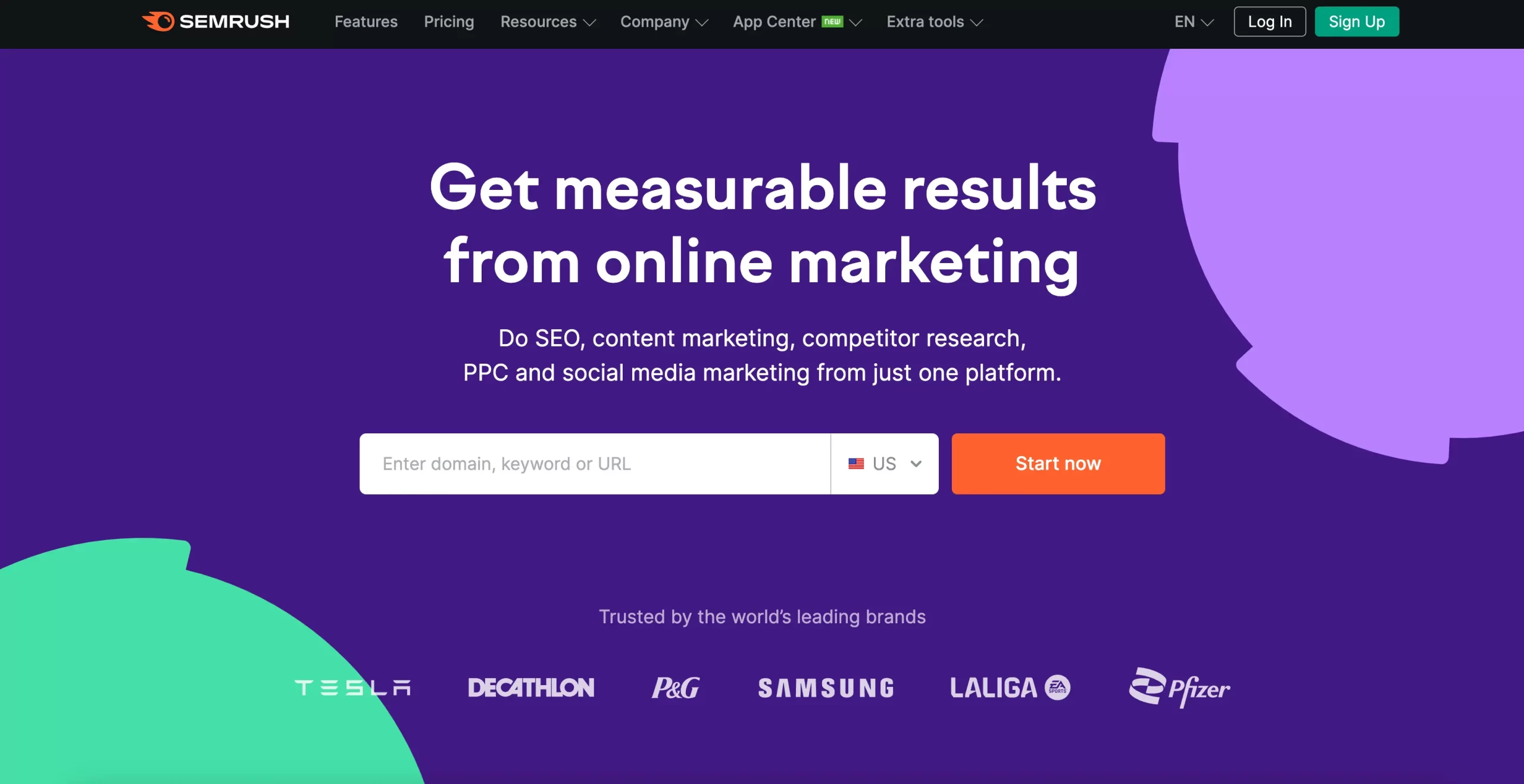
Other paid tools you’ll need are:
Lead generation software - I’m using OptinMonster to grow my email list and improve conversion rates. It’s very easy to use with a lot of features.
Email marketing solution - I’m using MailChimp for my website and many client websites, but there are other good solutions like Drip, Constant Contact, Klayvio, and many more.
Grammarly - A must-have tool for all online businesses. It helps you avoid spelling and grammar mistakes in anything you write online (including emails, proposals, etc.).
Canva - Sooner or later, you’ll need a tool to create nice-looking graphics and presentations, and Canva is a great choice.
Social media management platform - I'm using SocialPilot, but other good tools include Sprout Social, Buffer, and Hootsuite.
Online Chat Software - I'm using LiveChat, but other good options include Tidio and Jivo Chat.
Other free tools you’ll need are:
- Google Analytics
- Google Tag Manager
- Google Search Console
- Google Looker Studio
- Google Keyword Planner
- Google Docs
- Google Slides
- Google Forms
- Skype
My recommendation is to decide which tools you’ll use and spend some time learning how to use them and what features they offer. Once you start working with clients, your time will be limited, so it’s better to familiarize yourself with these tools in advance.
8. Define Your Business Model
The next step in the process is to define your business model, i.e., to decide how you’ll charge for your services.
The most popular business models for digital marketing agencies are:
- Per hour
- Per project
- Monthly fee
Per hour - You charge an hourly fee for your services. The rate varies from $30 to $120 per hour, depending on your experience, the client's location, the type of business, the type of services you provide, and the complexity of the work.
Per project - You agree with the client on a fixed amount to complete the project. If your estimations are correct, you make a profit, but if you make wrong estimations, you may make a loss.
Monthly fee - The client pays a monthly retainer for the agreed services. This usually applies to monthly SEO services, PPC management, and social media management.
The most profitable model is the ‘monthly fee’, and the least profitable is the ‘per hour’.
For new agencies, I recommend starting with the ‘per hour’ or ‘per project’ model. It’s not the most profitable model, but your goal at this stage is to get new clients and build your portfolio fast, and the ‘per hour’ model allows you to adjust your hourly rate to attract new clients.
9. Get Your First Client
So far, we have discussed how to prepare the ground for your startup agency, but you need clients to become a real business. A business with no clients is just an idea and not a business.
So, how do you get your first digital marketing client? Here are some ideas that worked for me in the beginning.
Friends and family - It’s very likely that your friends and family members have a business or work for a business that can use digital marketing services.
Reach out to them and offer to help them with their digital marketing efforts. Take a look at their website and their marketing tactics and come up with a plan on how you can help them get more clients, improve their search presence, and, in general, make more sales.
Since this is your first ‘official proposal,’ try to make it as detailed as possible with specific goals.
Explain to them why they need to invest some money in improving their website, why they need to have active social media pages, how they can benefit from Google ads, the missing opportunities from not using email marketing, and anything else needed to convince them to hire you as their digital marketing consultant.
Make sure that your pricing at this stage is attractive to them. Your goal is not to start making a profit but to build your portfolio.
The lessons learned from working with your first client will be invaluable, and they will help you tremendously when working with your first real client.
Online job boards - another way to get your first client is to use job search websites like Upwork and PeoplePerHour. These websites have hundreds of job postings related to digital marketing and can be a good starting point.
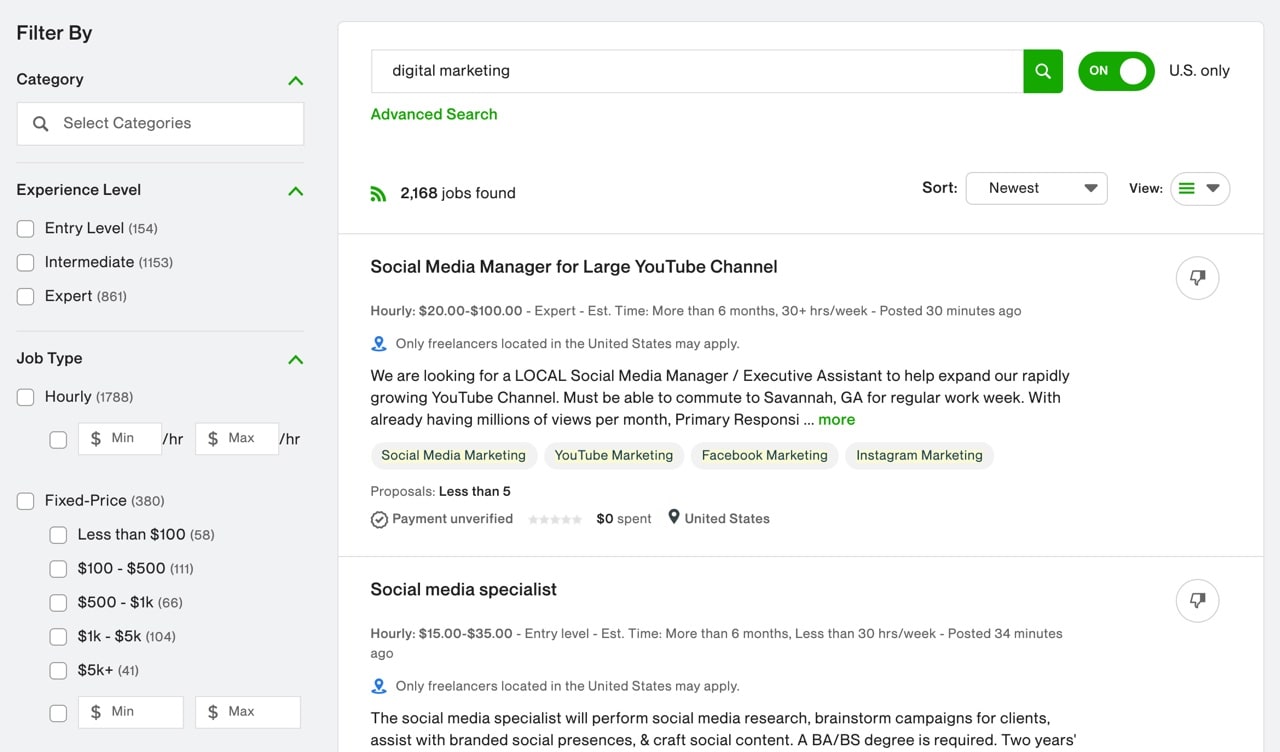
Here are a few pointers to help you out:
- When replying to a job request, ensure you answer ALL questions raised in the posting. Read the job description carefully and explain your plan of action.
- Reply fast. A job posting on those websites gets a lot of responses in a matter of hours, and usually, the work is assigned to those who reply first.
- Be honest and make realistic promises.
- Keep your prices low.
10. Start a Digital Marketing Blog
While working on your first client, you should find some time to start your own blog. A good blog with helpful content is by far the BEST lead generation tool for a digital marketing agency.
It’s the most efficient way to get new leads and, at the same time, convince your potential clients that you know what you’re doing,
When clients find you on Google search, you don’t have to ‘sell yourself’; they already know that you’re capable of ranking websites high in Google, which helps a lot with the signup process.
When creating content for your blog, try to target keywords related to the type of services you are currently offering and that potential clients may search for.
To give you an idea of how powerful this technique is, blogging has been my agency's main source of leads for the last 15 years. We managed to work with hundreds of clients worldwide without paying a dollar for advertising.
As a matter of fact, growing your blog should be your top priority because as your blog grows, so does your agency. Not relying on advertising will also help you quickly turn your company into a profitable business.
11. Build Your Portfolio And Customer Testimonials
Once you reach this point, your goal should be to continue building your portfolio and customer testimonials.
To build your portfolio fast, you will still have to provide services at a low cost, but getting testimonials and positive reviews from customers will help you sign up more and bigger customers in the future.
The reason I’m insisting on this point is that while it’s easy to get new clients with low marketing budgets to secure clients with big budgets that can generate good profit, you need to have a decent portfolio and reviews from past customers.
I know from experience that this will take time, so don’t get disappointed, but take it step-by-step, one client at a time.
12. Create Your Processes
As you grow your digital marketing agency and get more clients, you’ll get to a point where you’ll not be able to handle all projects by yourself.
That’s the time to consider hiring people to help you, but before you do, you’ll need to set up your processes.
By processes, we mean to have a set of SOPs (standard operating procedures) to document all the steps you take to perform a specific task. This includes the client onboarding process and all the services you’re offering.
It’s important to do this now before you get new people on board otherwise, you’ll lose a lot of valuable time explaining to your team how you want them to handle client work.
Use your current experience working with clients and spend some time creating email templates, proposal templates, custom reports, and checklists that anyone can follow to perform a specific task.
Keep things simple, and don’t overcomplicate things. You can create your processes using Google Docs and Gmail and organize them in folders.
13. Build Your Digital Marketing Team
When you get to the point of hiring new people, it means that you already have some clients, are already making a profit, and your processes are in place.
If you’re not at this stage yet, I recommend not hiring people now unless you have the funds to take the risk.
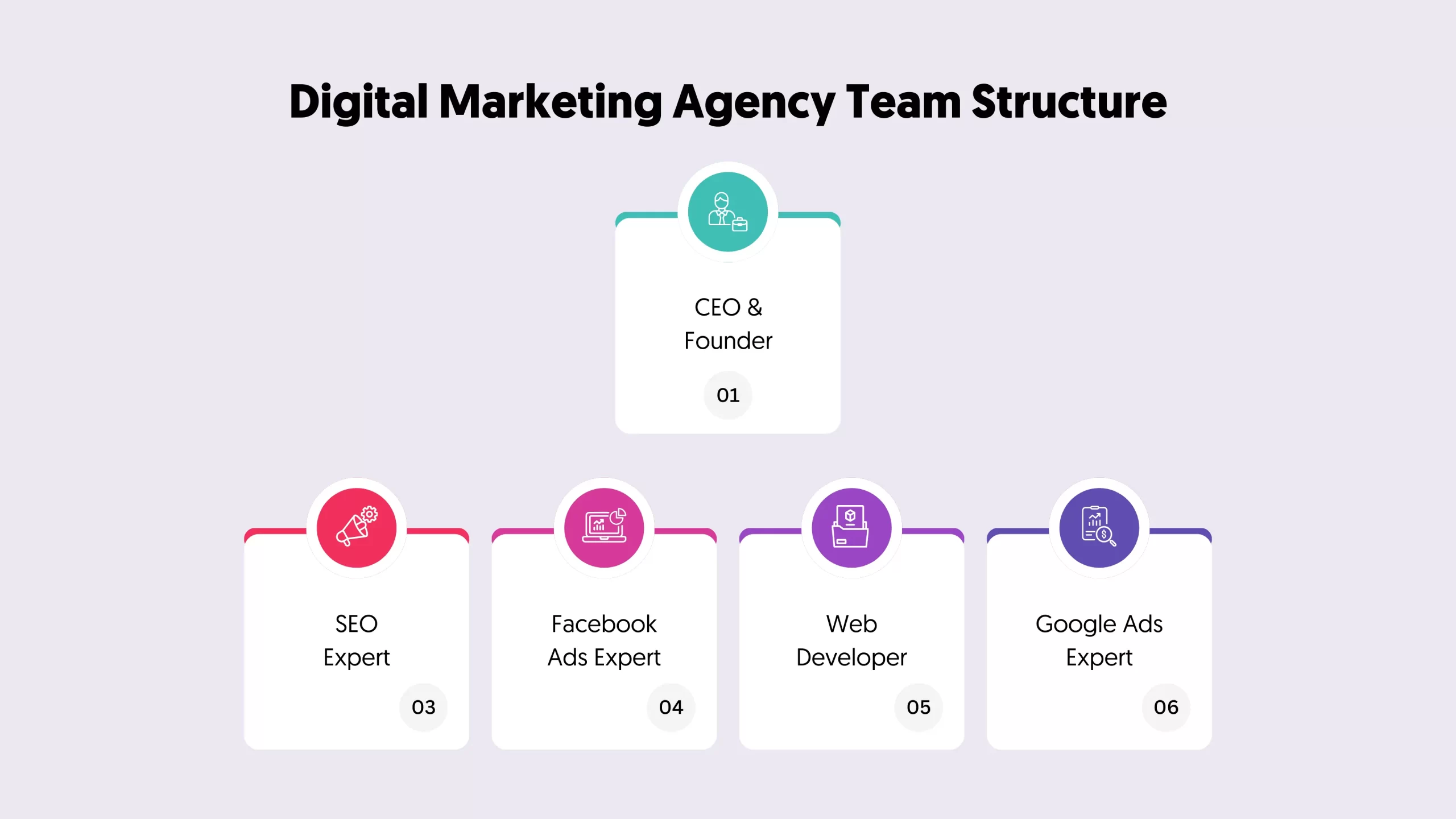
Building a digital marketing team to replace yourself is tricky and something that many digital marketing agency owners (including me) had difficulties executing initially.
Some tips to help you with this process:
Start by hiring people for tasks that are easy to execute - Explain to your employees what you expect them to do and document all steps. Refine your processes (created in the previous step) to be up-to-date and relevant.
Start by hiring freelancers instead of full-time employees - This will help you keep your costs low and give you more flexibility. You can use the extra help when needed and on a per-project basis.
Give them a pilot project to work on - It’s not always easy to understand what skills a freelancer has, so the best way to find out if they are a good fit for your team is to hire them for a pilot project before proceeding to a full-time hire. This will save you a lot of money and frustration from hiring the wrong people.
Key Learnings
A digital marketing agency is a great business to start. You can provide services from the comfort of your own home, you can be your own boss, and it’s a business that can scale without much capital.
While this sounds fantastic, there are a few things to consider before becoming a digital marketing service provider.
The first thing is that you need to know what you’re doing. If you’re new to digital marketing, then before rushing into creating a business, you first need to build your skills and gain working experience.
Start by doing digital marketing on your own sites and try different techniques until you have clear in your mind what is working and what is not.
Once you reach a point where you have some real results, you’ll also have the confidence to offer your services to other people.
Start slow, don’t try to offer all services from day one, and don’t expand too fast. Build your portfolio step-by-step, one client at a time.
When it’s time to hire new people, make sure that your processes are already in place and build your team gradually. Hiring remote employees is not easy, and you may have to try a number of candidates until you find people who can work with you as a team.
Building and growing a blog should always be your top priority. Blogging will help you get new clients without paying for advertising, generating huge advantages for your business.
Lastly, don’t forget the motto ‘the customer is always right’. Give your clients the attention they deserve and turn them into repeat clients. This way, you’ll minimize the cost of acquiring new customers, increase your profit, and scale your business faster.
